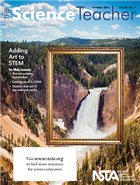Health Wise: If Students Injure Their Heads
By sstuckey
Posted on 2016-10-20
In a recent anonymous online survey, KidsHealth.org (KH 2015) asked parents and coaches what they should do if a child takes a hit to the head on a playing field. The correct answer—according to numerous health associations and laws in all 50 states and the District of Columbia—is that the child should immediately stop playing or practicing and then get checked out by a doctor before returning to the field.
About half of parents and almost as many coaches did not know that they should take those steps, according to the survey (KH 2015). Some parents told us that they would allow a child to get right back in the game or wait just 15 minutes before resuming the sport. Others said they would stop the child from playing but would not check in with a doctor.
Teachers need to know the correct steps to take, too, because “concussions can happen any time a student’s head comes into contact with a hard object, such as a floor, desk, or another student’s head or body,” according to a Centers for Disease Control and Prevention (CDC) factsheet for teachers (CDC 2015).
“Teachers and school counselors may be the first to notice changes in their students,” the CDC says (CDC 2015). “The signs and symptoms can take time to appear and can become evident during concentration and learning activities in the classroom. Send a student to the school nurse or another professional designated to address health issues, if you notice or suspect that a student has: 1. Any kind of forceful blow to the head or to the body that results in rapid movement of the head and 2. Any change in the student’s behavior, thinking, or physical functioning.”
Even days after a student takes a hit to the head, the CDC says (CDC 2015), teachers should notify the school nurse if a student
- appears dazed or stunned,
- is confused about or can’t recall events,
- repeats questions or answers questions slowly,
- shows behavior or personality changes,
- forgets class schedule or assignments, or
- loses consciousness (even briefly).
In addition to limiting physical activity, a student healing from a concussion may need cognitive rest and special school accommodations, says Dr. Rupal Christine Gupta, a pediatrician and former KidsHealth.org medical editor. To recover, a student may
- miss class time until cleared by a doctor;
- need to avoid activities that require concentration, such as quizzes or tests;
- need more time for instruction, homework, and tests;
- need to wear sunglasses due to light sensitivity; and
- benefit from having a 504 education plan (see “On the web”).
A student may also need speech-language therapy, environmental adaptations, and curriculum modifications, the CDC says (CDC 2015).
“Students may start to feel better before the concussion is fully healed,” Gupta says. “But all symptoms—including those affecting mood, thinking, and balance—must be back to normal, without the help of medicine, before students can return to normal activities. Getting another injury before the concussion fully heals could cause serious, long-term health problems. Some people have even died after getting a second concussion before the first one fully healed.”
Classroom activity
Students can conduct an anonymous survey of peers and faculty to assess awareness of proper concussion protocols, then create data-informed public service announcements to improve knowledge schoolwide. Students can adapt their survey questions from a quiz for teens (see “On the web”).
Michael E. Bratsis is senior editor for Kids Health in the Classroom (Kidshealth.org/classroom). Send comments, questions, or suggestions to mbratsis@kidshealth.org.
On the web
For educators
Factsheets: http://bit.ly/2aIhkmI, http://bit.ly/1OeVeYq
Lesson plan: http://bit.ly/2aJoGvY
Physiological effects of a concussion: http://bit.ly/1IdLPNn
Tips on 504 plans: http://bit.ly/2bcE1Fp
For students
Concussions mini-site in English and Spanish: http://bit.ly/2bcEHt2
Concussions quiz: http://bit.ly/2bc3pYI
References
Centers for Disease Control and Prevention (CDC). 2015. A fact sheet for teachers, counselors, and school professionals. http://bit.ly/2aXkkyh
KidsHealth.org (KH). 2015. Concussions: What parents and coaches say. http://bit.ly/2bnd5yL
Editor’s Note
This article was originally published in the October 2016 issue of The Science Teacher journal from the National Science Teachers Association (NSTA).
Get Involved With NSTA!
Join NSTA today and receive The Science Teacher,  the peer-reviewed journal just for high school teachers; to write for the journal, see our Author Guidelines and Call for Papers; connect on the high school level science teaching list (members can sign up on the list server); or consider joining your peers at future NSTA conferences.
the peer-reviewed journal just for high school teachers; to write for the journal, see our Author Guidelines and Call for Papers; connect on the high school level science teaching list (members can sign up on the list server); or consider joining your peers at future NSTA conferences.
The mission of NSTA is to promote excellence and innovation in science teaching and learning for all. Learn more about the Next Generation Science Standards at the NGSS@NSTA Hub.
Future NSTA Conferences
2016 Area Conferences
Disclaimer: The views expressed in this blog post are those of the author(s) and do not necessarily reflect the official position of the National Science Teaching Association (NSTA).



